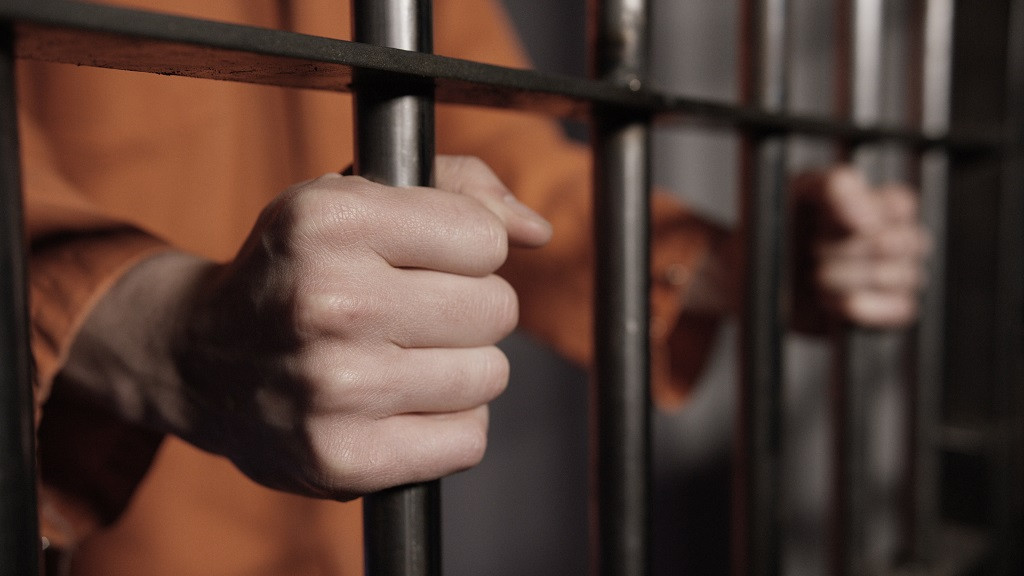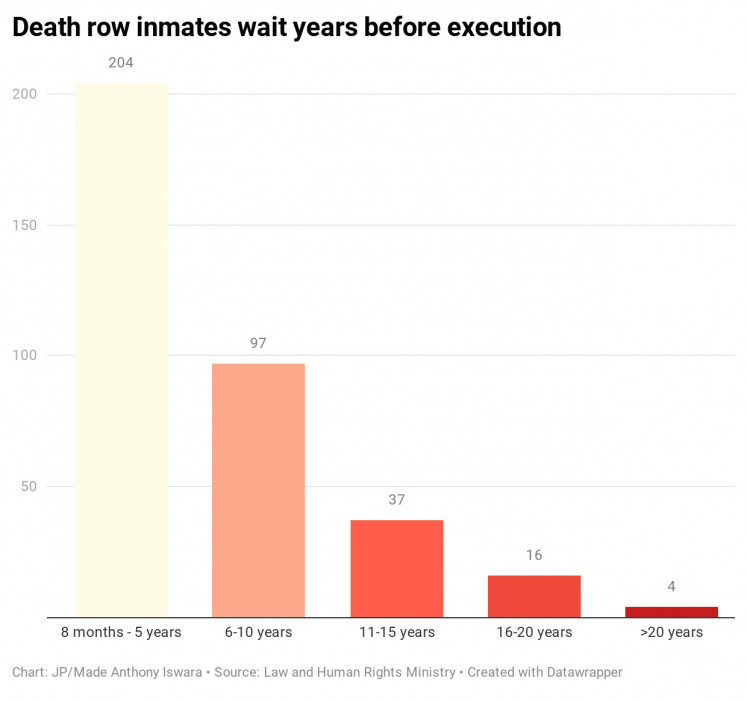Popular Reads
Top Results
Can't find what you're looking for?
View all search resultsPopular Reads
Top Results
Can't find what you're looking for?
View all search resultsPay attention to death row inmates' rights: Activists
“Many of those who are given death sentences harm themselves, probably because they are under immense psychological pressure,” Law and Human Rights Ministry research and development agency head Sri Puguh Budi Utami said.
Change text size
Gift Premium Articles
to Anyone
I
t was almost 8 p.m. when two prison guards at the Tangerang Women’s Penitentiary in Banten awoke Merri Utami. They were carrying a water bottle and a water scoop.
“Wash your face,” Merri recalled the guards ordering. The officers told her she would be transferred to Cilacap in Central Java but they would not say why she was being moved.
But on that evening – Saturday, July 24, 2016 – Merri knew it could be her execution.
Merri said she was sentenced to death after her ex-boyfriend tricked her into carrying 1.1 kilograms of heroin from Nepal to Indonesia. She was caught at Soekarno-Hatta International Airport in 2001 and said police officers tortured her so that she would sign a confession of guilt in a police interrogation report (BAP).
On July 25, 2016, she was moved to Nusakambangan at 4:30 a.m. under a tight escort after 12 years in her former jail.
“I kept staring at the road during the transfer and asking myself, ‘Is this the end of my 15-year journey of waiting for clemency?’” said Merri on the verge of tears during a webinar on Friday.
She recalled how she was eventually spared execution, which, according to her lawyers, was because she had sought clemency. Her lawyers said the Attorney General’s Office had chosen to review the case.
Imprisoned at Cilacap penitentiary in Central Java, Merri remains plagued by uncertainty as she hopes for clemency from President Joko “Jokowi” Widodo, years after her legal team requested it on July 26, 2016.
Activists are calling for more humane treatment of death row inmates as World Day Against the Death Penalty and World Mental Health Day coincide on Oct. 10.
Between 2017 and 2019, Indonesia imposed the death penalty in 146 cases, with 63 of those cases in 2019 alone, according to data from Reprieve, a nonprofit organization focusing on ending the death penalty.
Currently, 358 death row inmates are awaiting execution. Four have been waiting for 20 years, Law and Human Rights Ministry research and development agency head Sri Puguh Budi Utami said during a separate webinar on Thursday.
“Many of those who are given death sentences harm themselves, probably because they are under immense psychological pressure,” she said.
Death row convicts (JP/Made Anthony Iswara)Drug trafficking, terrorism and premeditated murder are among the violations that can result in the death penalty in Indonesia, but drug-related crimes account for most of the nation’s death sentences, said Community Legal Aid Institute (LBH Masyarakat) legal team member Aisya Humaida during the webinar.
She said the government violated certain rights during legal processes. For example, inmates had limited health access and were given subpar lawyers and legal assistance.
In Merri’s case, Aisya said prosecutors has violated her rights by allegedly torturing her so that she would sign the BAP.
Merri's legal team at LBHM told The Jakarta Post on Friday that the alleged torture, as well as alleged sexual harassment during interrogation, were part of Merri’s account but that no legal or court document indicated Merri’s position. However, the National Commission on Violence Against Women (Komnas Perempuan) had acknowledged the allegation in its reports, the lawyers said.
Aisya added that the 1995 Correctional System Law, which is currently being revised by the House of Representatives, did not specify the rights of death row inmates, making them susceptible to human rights violations.
“Indonesia is really confident in continuing death penalties yet the implementing regulations have yet to regulate them,” said Aisya.
LBH Masyarakat has been collecting signatures for a petition on change.org in support of clemency for Merri.
Regulations also disregarded inmates’ mental health, Aisya said, even as many death row inmates suffered from mental health problems as a result of being locked up for years awaiting their executions.
Reprieve researcher Teresa Prasetio said her team had found that prison overcrowding, budget shortages, limited access for family visits and a lack of activities outside prison cells had created an unconducive situation for inmates’ mental health, in addition to death row inmates’ anxiety about their impending execution.
“The anxiety and mental stress of this poor prison condition can be said to be an additional punishment that is actually very cruel, inhumane and degrading to human dignity,” she said during Friday’s webinar.
She advised the government to improve health facilities at prisons, hold mental health check-ups for death row inmates and facilitate visits from family members and legal advisors, among other recommendations.
The Law and Human Rights Ministry’s Corrections Directorate General was not immediately available for comment when contacted by the Post on Friday.
However, Sri of the ministry’s R&D division recommended a scheme where death sentences could be commuted to life sentences if inmates showed good behavior after serving a 10-year term.
“Let’s all join hands to actualize just and civilized humanity as mandated by the Pancasila ideology,” said Sri who was a former correctional affairs director general.











